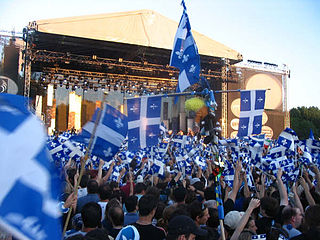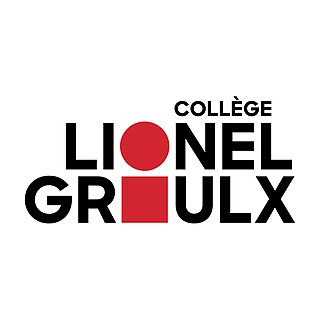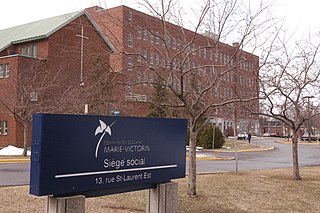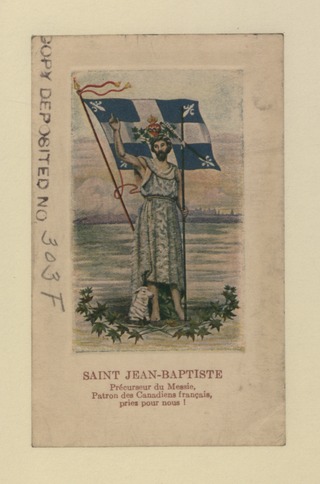Related Research Articles

Lionel Groulx was a Canadian Roman Catholic priest, historian, professor, public intellectual and Quebec nationalist.

Joseph-Napoléon-Henri Bourassa was a French Canadian political leader and publisher. In 1899, Bourassa was outspoken against the British government's request for Canada to send a militia to fight for Britain in the Second Boer War. Prime Minister Sir Wilfrid Laurier's compromise was to send a volunteer force, but the seeds were sown for future conscription protests during the World Wars of the next half-century. Bourassa unsuccessfully challenged the proposal to build warships to help protect the empire. He led the opposition to conscription during World War I and argued that Canada's interests were not at stake. He opposed Catholic bishops who defended military support of Britain and its allies. Bourassa was an ideological father of French-Canadian nationalism. Bourassa was also a defining force in forging French Canada's attitude to the Canadian Confederation of 1867.

Jean Drapeau was a Canadian politician who served as mayor of Montreal for 2 non-consecutive terms from 1954 to 1957 and from 1960 to 1986. Major accomplishments of the Drapeau Administration include the development of the Montreal Metro entirely underground mass transit subway system running on 'whisper quiet' rubber wheels, a successful international exposition Expo 67 as well as the construction of a major performing arts centre, the Place des Arts. Drapeau also secured the hosting of the 1976 Summer Olympics and was instrumental in building the Olympic Stadium and then world's tallest inclined tower. Drapeau was responsible for securing a Major League Baseball franchise, with the creation of the Montreal Expos in 1969. Drapeau's main legacy is Montreal's attainment of global status under his administration. He was the longest serving mayor of Montreal.

Le Devoir is a French-language newspaper published in Montreal and distributed in Quebec and throughout Canada. It was founded by journalist and politician Henri Bourassa in 1910.

Quebec nationalism or Québécois nationalism is a feeling and a political doctrine that prioritizes cultural belonging to, the defence of the interests of, and the recognition of the political legitimacy of the Québécois nation, particularly its French Canadian population. It has been a movement and a central issue in Quebec politics since the beginning of the 19th century. Québécois nationalism has seen several political, ideological and partisan variations and incarnations over the years.
The Royal Commission on Bilingualism and Biculturalism was a Canadian royal commission established on 19 July 1963, by the government of Prime Minister Lester B. Pearson to "inquire into and report upon the existing state of bilingualism and biculturalism in Canada and to recommend what steps should be taken to develop the Canadian Confederation on the basis of an equal partnership between the two founding races, taking into account the contribution made by the other ethnic groups to the cultural enrichment of Canada and the measures that should be taken to safeguard that contribution".

Jean Charles Dominique de Lacretelle,, was a French historian and journalist.

Michel Chartrand was a Canadian trade union leader from Quebec.
L'Action nationale is a French-language monthly published in Quebec, Canada.
The Traitor and the Jew, a history by Esther Delisle, was published in French in 1992. She documented the history of antisemitism and support of fascism among Quebec nationalists and intellectuals during the 1930s and '40s.
The Académie des lettres du Québec is a national academy for Quebec writers.

Joseph-Edmond-André Laurendeau was a journalist, politician, co-chair of the Royal Commission on Bilingualism and Biculturalism, and playwright in Quebec, Canada. He is usually referred to as André Laurendeau. He was active in Québécois life, in various spheres and capacities, for three decades. Laurendeau's career also "spanned the most turbulent periods in the history of Canada".
This article lists events from the year 2007 in France.

Jeune Nation was a French nationalist, neo-Pétainist and neo-fascist far-right movement founded in 1949 by Pierre Sidos and his brothers. Inspired by Fascist Italy and Vichy France, the group attracted support from many young nationalists during the Algerian war (1954–62), especially in the French colonial army. Promoting street violence and extra-parliamentarian insurrection against the Fourth Republic, members hoped the turmoils of the wars of decolonization would lead to a coup d'état followed by the establishment of a nationalist regime. Jeune Nation was the most significant French neo-fascist movement during the 1950s; it gathered at its height 3,000 to 4,000 members.
Michael Derek Behiels is a Canadian historian who served as a professor and University Research Chair in the Department of History at the University of Ottawa, specializing in twentieth-century Canadian politics. A student of Ramsay Cook, he is a prominent defender of Pierre Trudeau's conception of federalism: no special status for Quebec and maintenance of linguistic minority rights. In 1985, while a faculty member at Acadia University, his published doctoral dissertation Prelude to Quebec's Quiet Revolution was nominated for the Governor General's Award for English-language non-fiction. Thanks to this book's success, he is still considered to be a major authority on the thought of former Le Devoir editor André Laurendeau.

Collège Lionel-Groulx is a general and professional education college (CEGEP) located in Sainte-Thérèse, Quebec, Canada. This college has around 6,000 students in regular training and around 2,000 in continuing education.

Centre de services scolaire Marie-Victorin (CSSMV) is a French-language school service centre operating in the Province of Quebec, Canada and serving the tables of Longueuil, Brossard and Saint-Lambert. CSSMV was established on July 1, 1998, and became one of the most important school centres in Quebec. The board's headquarters are in Longueuil.

Clerico-Nationalism was a right-wing ideology current in Quebec from the years after World War I until the end of the 1950s,. Clerico-nationalism was a traditionalist, religious form of French Canadian nationalism focused on the Roman Catholic Church. In France, a similar ideology was referred to as National Catholicism.
Commission scolaire Marie-Victorin (CSMV) was a French-language, school board operating in the Province of Quebec, Canada and serving the municipality of Longueuil, Brossard and Saint-Lambert. The board's headquarters are in Longueuil.
References
- 1 2 "Jeune Canada | Canadian organization | Britannica". www.britannica.com. Retrieved 2024-08-05.
- ↑ Nadeau, Jean-Francois (2011-09-30). The Canadian Fuhrer: The Life of Adrien Arcand. James Lorimer & Company. pp. 91–93. ISBN 978-1-55277-904-0.